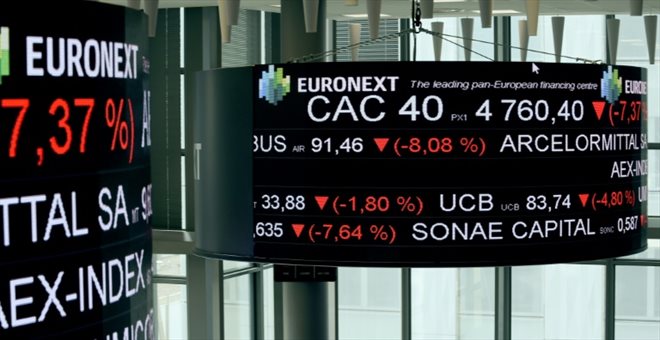The control room of Euronext, the company that manages the Paris Stock Exchange (AFP/Archives/ERIC PIERMONT)
The Paris Stock Exchange ended down 0.84% on Wednesday, weighed down by its flagship luxury stocks, starting with LVMH, now scrutinized with more concern by investors.
The star CAC 40 index ended at 7,194.09 points, the lowest since August 18. The day before, he had already lost 0.34%.
Biggest drop in the CAC 40, LVMH lost 3.64% to 731.50 euros, the lowest level of its share since January 5. The price of LVMH has fallen more than 5.7% since the start of the week and even 18% since July 14, in particular due to the difficulties of growth in China, one of its main markets.
LVMH also lost last weekend its rank of the most valued company in Europe, dethroned by the Danish laboratory Novo Nordisk.
Alongside it, Kering also lost 2.31% to 468.70 euros and Hermès 1.86% to 1,833.40 euros.
The whole sector in Europe looked gray after the general meeting of the Swiss Richemont, where owner Johann Rupert said that inflation was beginning to affect sales in the sector in Europe according to the Bloomberg agency.
In addition, the HSBC bank also significantly reduced the price target for LVMH’s share, while maintaining the same recommendation. It also fell, but to a lesser extent, the targets of Kering and Hermès.
In addition, “other sectors are also of good quality with healthy balance sheets” while being less expensively valued on the stock market, underlines Michael Nizard, director of multi-asset investments at Edmond de Rothschild AM.
The Paris market is also still handicapped by the rise in commodity prices, oil in the lead.
“Markets are pricing in the risk where stagflation”, i.e. a situation where inflation is high but growth is weak, “would be the marker of the economy”, describes Mr. Nizard .
On Wednesday at the Paris close, the barrel of Brent from the North Sea was still hovering around the 90 dollar mark per barrel, after having crossed it for the first time of the year on Tuesday, after the announcement of the extension of the reduction in production from Saudi Arabia and exports from Russia until the end of 2023.
But another scenario, which the manager prefers, supports that China, where activity is decelerating sharply, will “export its slowdown”, allowing oil demand and therefore prices to be reduced. This would make it possible to continue the path of disinflation, which the markets are hoping for.
© 2023 AFP
Did you like this article ? Share it with your friends with the buttons below.




